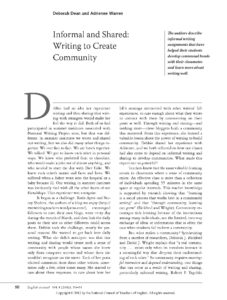Author: Deborah Dean and Adrienne Warren
Summary: How can we use informal writing to cultivate the meaningful interaction and deepened understanding that build the foundation of classroom community? Here, Deborah Dean and Adrienne Warren’s explain how a daily writing and sharing routine helped build community and bring meaning to the writing process. This piece would be useful in professional learning focused on informal writing and creating a community of writers.
Original Date of Publication: July 26, 2012
Excerpt
Teachers know that the most valuable learning occurs in classrooms where a sense of community exists. An effective class is more than a collection of individuals spending 55 minutes in the same space at regular intervals. This teacher knowledge is supported by research showing that “learning is a social process that works best in a community setting” and that “through community, learning can grow” (Bickford and Wright). Community encourages rich learning because of the interactions among many individuals, not the limited, two-way exchange of ideas or information that is often the case when students fail to form a community.
But what makes a community? Synthesizing from a number of researchers, Deborah J. Bickford and David J. Wright explain that “a real community…exists only when its members interact in a meaningful way that deepens their understanding of each other.” So community requires meaningful interaction and deepened understanding, two things that can occur as a result of writing and sharing, particularly informal writing. Robert P. Yagelski explains, “As we write, we become connected to that moment and other moments we may be trying to describe and indeed to all those other selves who may somehow figure into our writing, including potential readers who are thus connected to the writer in a real way through a future act of reading” (17). Writing, especially when we know the writing will be shared with others, promotes both deepened understandings and meaningful interactions—and these develop community, which leads to improved learning conditions.
Related Resources
- Thank You for Sharing: Developing Students’ Social Skills to Improve Peer Writing Conferences
- What if We Learned About Our Students Differently?
Copyright © 2012 National Council of Teachers of English. Reprinted with permission.
Dean, Deborah and Adrienne Warren. 2012. “Informal and Shared: Writing to Create Community.” English Journal 101 (4): 50-54.
Original Source: National Writing Project, https://archive.nwp.org/cs/public/print/resource/3918
